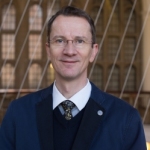| February 24, 2011 |
no comments
At the same time, the book suffers some significant shortcomings that cannot be attributed to the pluralistic landscape of evangelicalism. The doctrine of the church presented in this work is framed in the first chapter by the argument that the church as a trinitarian community is a being-driven church and in the last chapter by the proposal that the church as a missional community is a being-driven church. This nuanced argument separates the missional nature of the church artificially from its divine nature. The presentation of the church as a trinitarian community appears like an abstract, detached theory, while the missional character of the Christian community is displayed as a consequence of the church’s worship, service, discipline, and other practical dimensions. If this portrayal of a separation of the nature (trinitarian essence) and purpose (mission) of the church is a correct assessment, then evangelical ecclesiology is going to be hard-pressed to find any theological justification for its diverse cultural identities. Culture and theology are then pushed apart in an attempt to describe the church that sandwiches all that the church does between what the church is and the purpose for which it exists. At least methodologically, the choice should have been made to speak of the church as a missional community in the same breath it is proclaimed as a trinitarian community. This would allow for a fruitful discussion with existing proposals beyond the evangelical community and with theological considerations beyond the confines of ecclesiality. In this sense, the book is less ecumenical in nature than it is intended to be.
Exploring Ecclesiology integrates the various dimensions of culture into the quest for an evangelical ecclesiology.
For a Pentecostal audience, the relegation of the missional character of the church to the end of the discussion is also apparent in the position of discussions about spiritual gifts. Surprisingly, neither the trinitarian nor the eschatological theory of the first chapters contains any consideration of the essential relation between the church and the Spirit of God. The biblical image of the church as the temple of the Holy Spirit is notably absent. Neither is the eschatological nature of the church interpreted pneumatologically in any significant way. The question if culture can be seen as a playground for the divine Spirit is only marginally pursued. As a result, the topic of spiritual gifts is not broached until the discussion of the church as a serving community (chapter 9) and more notably in practical questions of church order and discipline. Such a restriction in scope is surprising considering the cultural emphasis of the authors and the general surge of charismatic ecclesiologies. Pentecostals, who themselves are struggling to formulate an ecclesiology, have generally equated the church with the mission of God instead of making mission one aspect of church practice among others. A pneumatological orientation and emphasis on spiritual gifts are a hallmark of this endeavor. The neglect of these dimensions in the portrayal of evangelical ecclesiology suggests strongly that Pentecostals are well advised not to pattern their ideas after this proposal. At least in their understanding of the church, Pentecostals in North America cannot consider themselves to be evangelicals.
Reviewed by Wolfgang Vondey
Preview this book online: christianbook.com/reader/?item_no=431739
Publisher’s page: bakerpublishinggroup.com/books/exploring-ecclesiology/269590
Tags: ecclesiology, exploring
Category: In Depth, Winter 2011

About the Author: Wolfgang Vondey, Ph.D. (Marquette University) and M.Div. (Church of God Theological Seminary), is Professor of Christian Theology and Pentecostal Studies at the University of Birmingham, UK. He is an ordained minister with the Church of God (Cleveland, TN). His research focuses on ecclesiology, pneumatology, theological method, and the intersection of theology and science.


